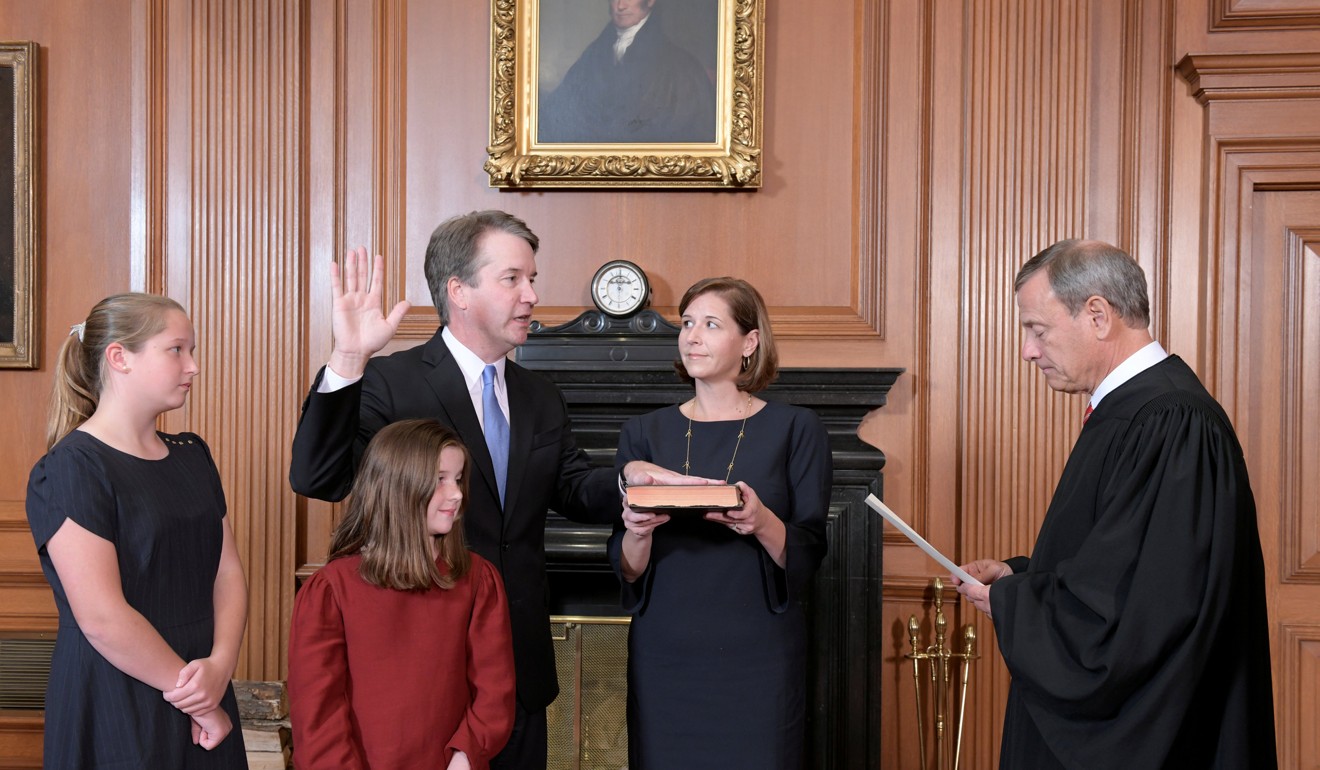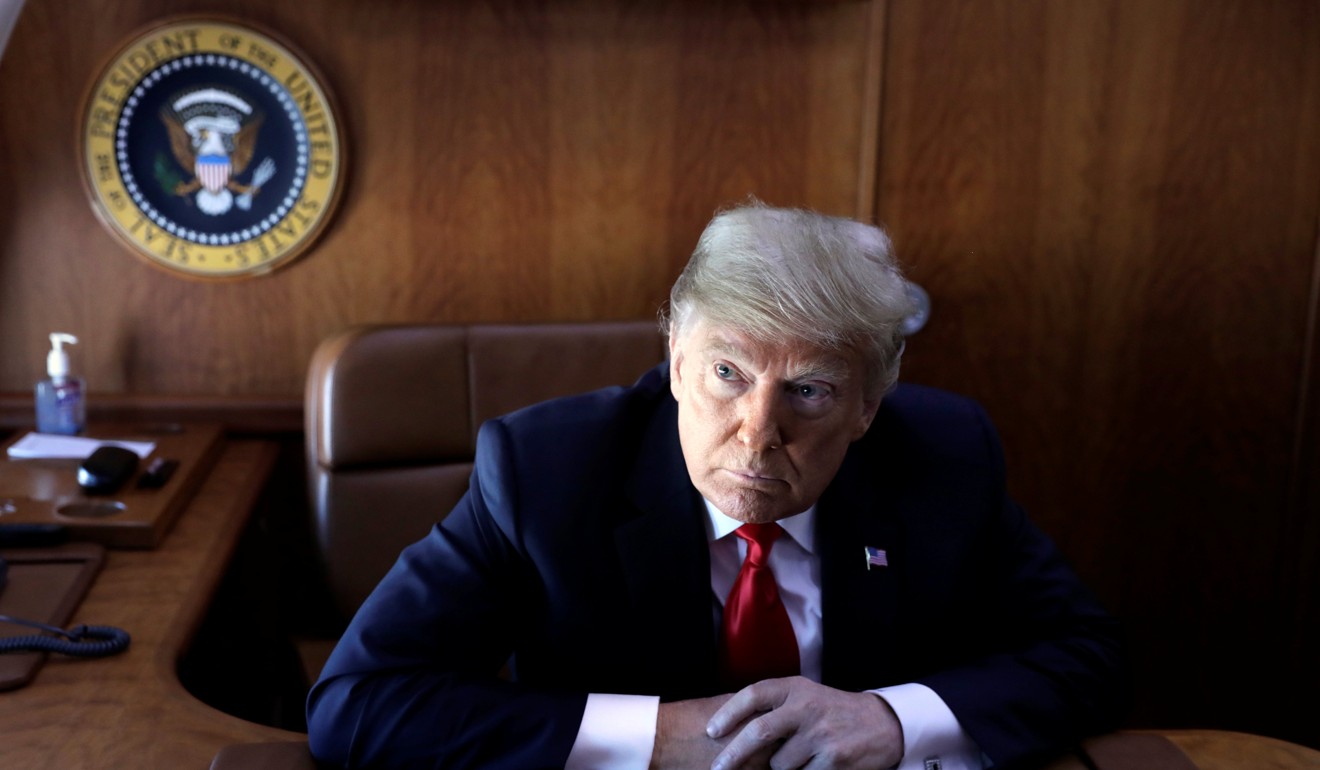
Lisa Murkowski: the only Republican senator to oppose Brett Kavanaugh’s confirmation
US President Donald Trump predicted that Senator Lisa Murkowski ‘will never recover’ politically for her vote against Supreme Court nominee Brett Kavanaugh
Once again, Lisa Murkowski was all alone.
Eight years ago, Republican leaders abandoned the Alaska senator after she lost to a tea party primary challenger.
On Saturday, some 20 hours after delivering an anguished speech to a nearly empty Senate chamber, she etched her place in history as the only Republican senator to oppose Brett Kavanaugh’s confirmation to the Supreme Court.
She also became the target of sharp criticism from US President Donald Trump, who predicted in brief telephone interview Saturday that she would “never recover” from her vote and never be forgiven by the people of her state.
As the rest of her party celebrated Kavanaugh’s ascent to the nation’s highest court after a tumultuous nomination jolted by allegations of sexual misconduct, Murkowski reflected on what she said was a wrenching decision that had kept her from eating and sleeping well.
“Painful,” she said late Friday, describing her choice, which she attributed to concerns about Kavanaugh’s temperament when he testified before the Senate Judiciary Committee about the allegations last week.
After the vote on Saturday, she voiced hope that Kavanaugh would work “to restore or build that public confidence.”
Republicans confirmed Kavanaugh without Murkowski’s help, thanks to the support of her close friend and fellow centrist, Senator Susan Collins.

But Murkowski’s vote was a stark reminder of the divisions the nomination fight sparked and of her increasingly lonely position in a party that has become less hospitable to moderating voices during Trump’s presidency.
“I was surprised,” said Senator Lindsey Graham.
“She has every right to vote the way she would like. I disagree that he’s not the right guy at the right time.”
As one of just two Republican women in the Senate who favour abortion rights – Collins is the other – and an opponent of the Republican push to repeal and replace the Affordable Care Act last year, Murkowski was seen as one of a handful of senators who could vote either way on Kavanaugh, even before the allegations against him emerged publicly in September.
Brett Kavanaugh sworn in as US Supreme Court justice after bruising political battle
Unlike the other swing voters who revealed their decisions the last few days in splashy speeches and high-profile interviews, the first indication that Murkowski had decided to oppose Kavanaugh arrived when she cast a vote against advancing his nomination on Friday morning.
“I don’t have a statement right now because I did not come to a decision on this until walking into the floor this morning,” she said in an impromptu appearance after the key procedural vote to a pack of reporters waiting outside the Senate chamber.

She was torn after a process she said was neither fair to Kavanaugh nor satisfactory for victims of sexual assault.
“I believe we are dealing with issues right now that are bigger than a nominee,” she said, and it “just may be that in my view he’s not the right man for the court at this time.”
It was a signature moment in Murkowski’s political career, which has spanned nearly two decades. Her father Frank Murkowski, a titan in Alaska politics, appointed her to fill his Senate seat in 2002 when he became governor.
She quickly climbed the ranks in the Senate and became a junior member of now-Senate Majority Leader Mitch McConnell’s leadership team, developing a reputation for her devotion to delivering resources to her far-flung state.
Donald Trump handed one of the biggest victories of his presidency with Brett Kavanaugh confirmation
In 2010, at the height of the tea party movement, she lost her primary to a far right challenger, Joe Miller. After her defeat, Murkowski pressed on, waging an extraordinary write-in campaign in the general election, while party leaders supported Miller.
Murkowski campaigned aggressively and creatively, handing out wristbands and reminding voters how to spell her name. She won and returned to Washington with a fresh perspective, having secured a major victory without owing any of it to party leadership.
Murkowski’s rejection of Kavanaugh marked the third time she has opposed a Supreme Court nominee – but the first against a nominee from a Republican president. She had spoken about Kavanaugh with Collins and other colleagues before deciding to go her own way.
The Alaska senator faced pressure back home to vote no. The state’s governor and lieutenant governor came out against Kavanaugh in late September, citing concerns that he posed a threat to health care protections and Native American tribal government, in additions to worries about the allegations he faced.
Murkowski concluded that Kavanaugh would not be a threat to protections for people with pre-existing medical conditions or to Alaska Natives, she said in her speech on the Senate floor Friday night. It was Kavanaugh’s fiery testimony, charged with partisan accusations, that swayed her.
“After the hearing that we all watched last week, last Thursday, it became clear to me, or was becoming clearer, that that appearance of impropriety has become unavoidable,” she said.
Murkowski said she has experienced a “#MeToo” moment, Alaska Public Media reported. Asked Saturday whether that factored into her vote, Murkowski replied, “Every one of us brings experiences, life experiences to the position that we hold here. And that shapes who we are. But I don’t want to suggest that something that I have chosen not to make public, not to discuss, that that becomes an issue point for others.”
As for the women who protested the Kavanaugh vote, Murkowski said, “I was closing my eyes and praying. Praying for them. Praying for us. I’m praying for the country.”
Now, Murkowski is facing a backlash on the right for her vote.
“Hey @LisaMurkowski – I can see 2022 from my house,” tweeted former Alaska governor and Republican vice presidential nominee Sarah Palin, referencing the next time Murkowski would face re-election.
In the interview with The Washington Post, Trump said: “I think the people from Alaska will never forgive her for what she did.”
Murkowski is part of shrinking crop of moderates in a party that has enthusiastically embraced Trump. While she has voiced her concerns about him, she has done so with less fanfare than retiring senators Jeff Flake and Bob Corker, who have routinely offered stinging, televised rebukes of Trump’s presidency.
Even as she opposed Kavanaugh, Murkowski requested that her final vote be recorded as “present” as a courtesy to Senator Steve Daines, a Kavanaugh supporter who was away from the Senate for his daughter’s wedding. She said she hoped the gesture would remind people of the things they can do to help each other.
But the Kavanaugh nomination has further poisoned already strained, partisan relations in the Senate. With the midterm elections just weeks away, there appeared to be little hope for bridging the divide any time soon.
As the Friday morning vote to advance Kavanaugh’s nomination unfurled, the mood inside the Senate chamber was tense.
Called out in alphabetical order, senators stood from their chairs to announce their vote, a formal style reserved for the most important business.
When it was Murkowski’s turn, she rose and practically whispered “no”, returning to her chair and snot talking to any senator for another 10 minutes as she stared stone-faced at the front of the room.
Finally, toward the end of the roll-call, Collins reached over and grabbed Murkowski’s left arm. They smiled, laughed and whispered to each other about the weighty votes they just cast.
Later, Collins delivered a speech formalising her support for Kavanaugh.
About 20 Republicans and a half-dozen Democrats were on hand. As she finished, her Republican colleagues stood and cheered.
In the evening, Murkowski arrived to a nearly empty chamber to deliver her own address. A few staff lingered on the outer edge of the floor and just two reporters were in the press gallery above. For 26 minutes she explained how she arrived at her vote.
When Murkowski finished, no one applauded.

